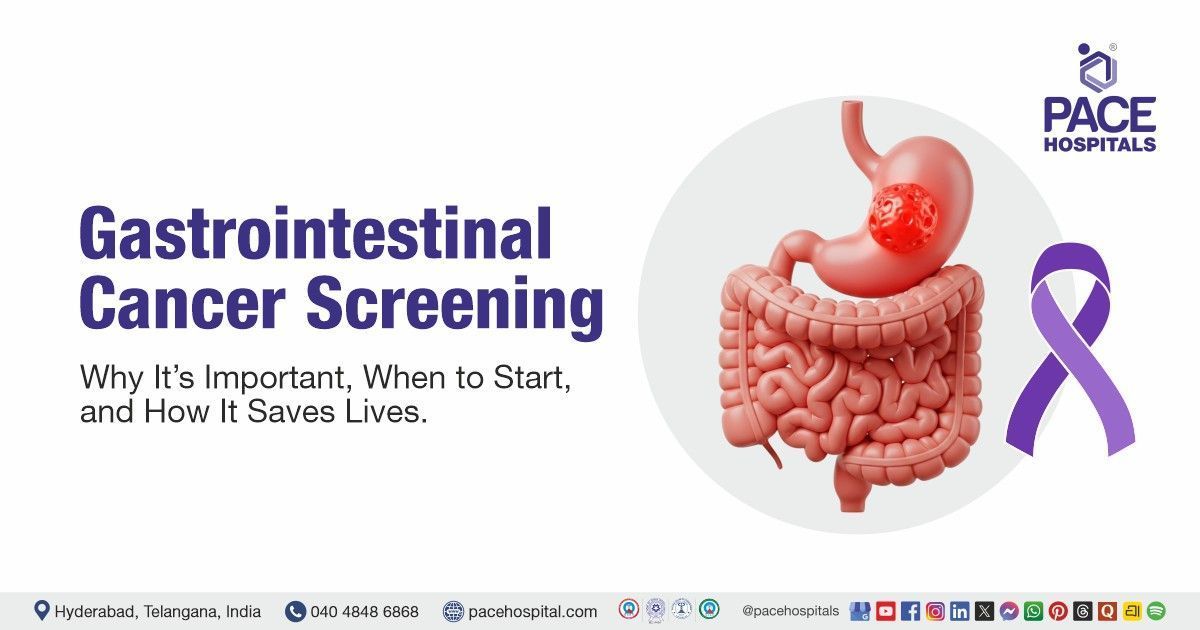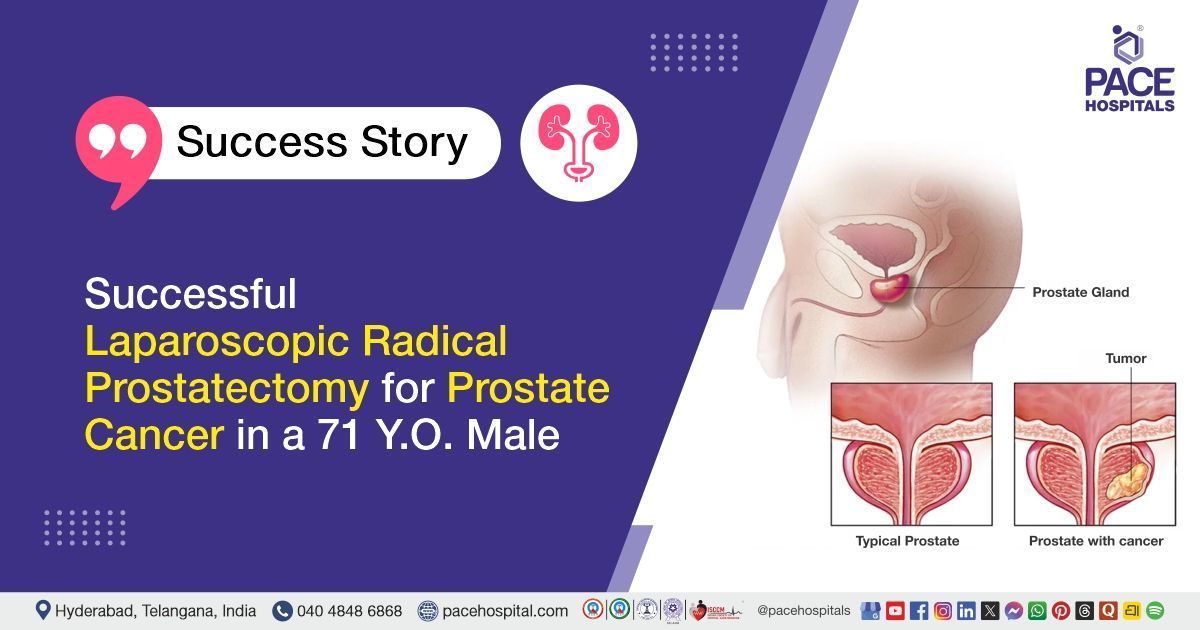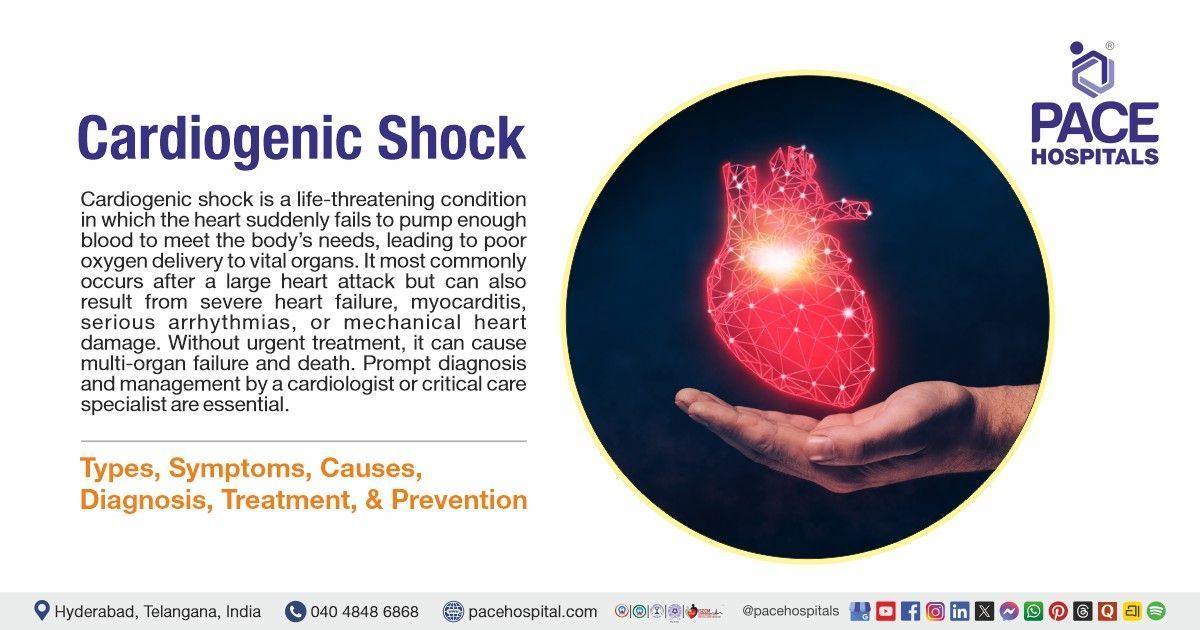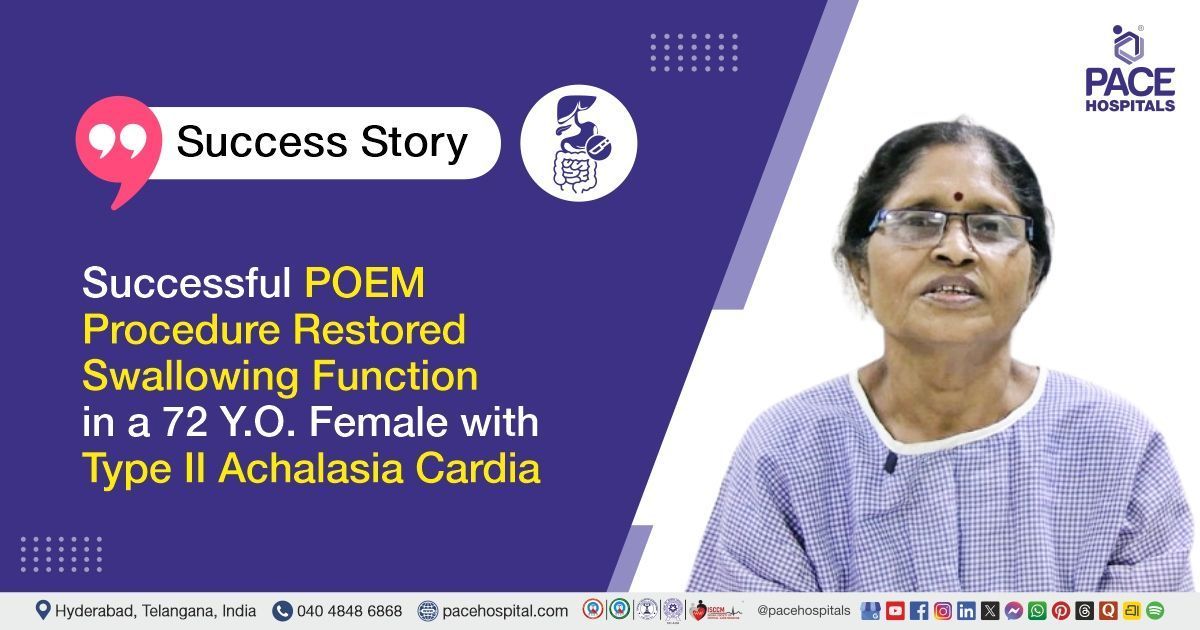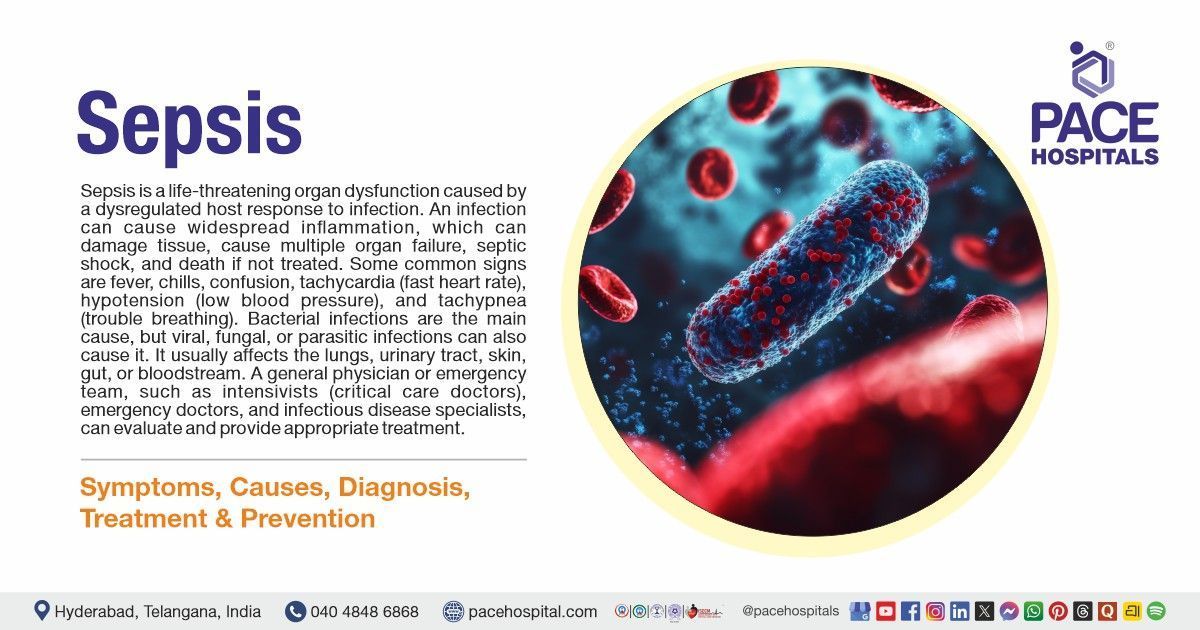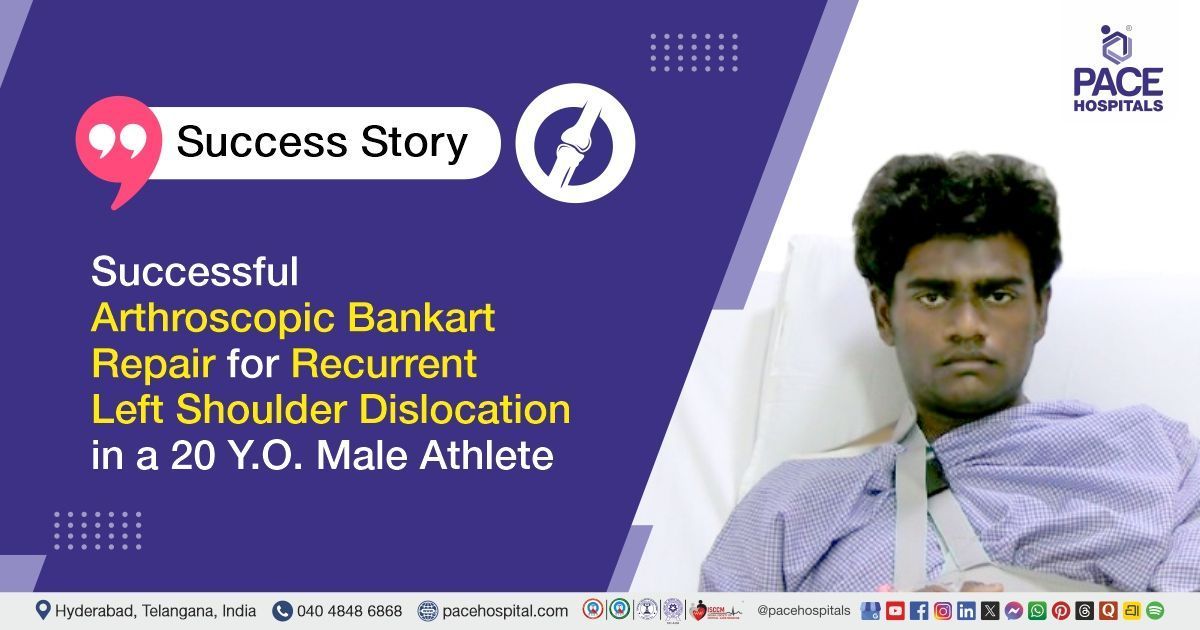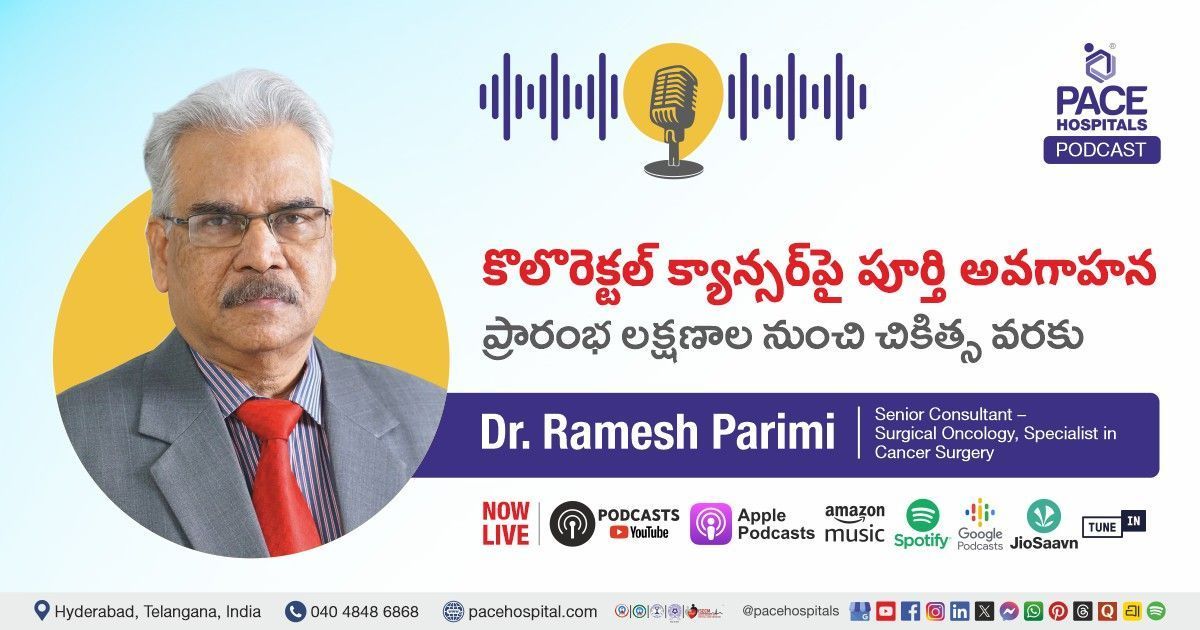Gastrointestinal Cancer Screening: Importance, Risk Groups, Tests and Early Detection Guide
PACE Hospitals
Written by: Editorial Team
Medically reviewed by: Dr. Suresh Kumar S - Surgical Gastroenterologist, Advance Laparoscopic & Liver Transplant Surgeon
Gastrointestinal (GI) cancers represent a significant global health burden, affecting organs such as the esophagus, stomach, liver, pancreas, small intestine, colon, and rectum. Many of these cancers develop silently, showing minimal or no symptoms in early stages. By the time symptoms appear, the disease may have already advanced, making treatment more complicated.
Early screening remains one of the most effective approach for reducing mortality. It helps identify precancerous lesions, detect cancer at an early and curable stage, and prevent progression through timely intervention. Today, advanced screening tests and tools evaluated by specialist make it possible to detect abnormalities far before they become life-threatening.
This comprehensive guide explains why GI cancer screening matters, when individuals should consider it, which tests are used, and how gastroenterologists play a central role in accurate early diagnosis and prevention.
Why Screening for GI Cancers Matters?
The digestive system is long and complex, making cancers of the GI tract highly varied in origin and behaviour. What they share, however, is that early cancers are far easier to treat and have significantly better outcomes compared to advanced disease.
Why screening is essential:
- Early Detection Makes Treatment More Effective: When gastrointestinal cancers are found in their initial stages, they respond far better to treatment. Surgery, endoscopic procedures, and newer targeted therapies tend to work best before the disease spreads, giving patients a significantly higher chance of recovery.
- Screening Can Prevent Cancer Before It Starts: Certain conditions in the digestive tract, such as colon polyps, Barrett's esophagus, precancerous stomach changes, or liver damage from cirrhosis - can gradually develop into cancer if unnoticed. Identifying these problems early and treating them promptly can prevent cancer from forming altogether.
- Early GI Cancers Often Show No Warning Signs: Many gastrointestinal cancers develop quietly in their early stages. By the time symptoms like abdominal discomfort, unexplained weight loss, difficulty swallowing, or bleeding appear, the disease may already be advanced. This makes proactive screening especially important and crucial.
- People at Higher Risk Need Closer Monitoring: Individuals associated with a strong family history, inherited illnesses, or long-standing digestive diseases benefit from ongoing monitoring and observation. Tailored screening schedules and treatment plans assistance detect changes in early phase and lowers the complications that can arise during late-stage diagnosis.
- Early Diagnosis Supports a Better Quality of Life: Finding cancer in early stage usually means less aggressive treatment, shorter recovery time, and a smoother overall experience. Early detection helps avoid major surgeries and complex therapies, allowing individuals to maintain a better quality of life.
Role of Gastroenterologists in GI Cancer Screening
Gastroenterologists play a key role in identifying and managing cancers of the digestive system. Their training allows them to recognise early, often subtle changes in the lining of the GI tract, carry out specialised endoscopic procedures, and assess individual risk profiles. This combination of skills makes them essential in any program focused on early detection and prevention of gastrointestinal cancers.
Gastroenterologists help by:
- Assessing personal and family risk profiles
- Recommending the right screening tests
- Performing endoscopy, colonoscopy, and advanced imaging procedures
- Identifying precancerous lesions
- Advising lifestyle and preventive strategies
- Coordinating with health professionals related to oncology, radiology, and surgery teams
Their involvement ensures that screening is not only accurate but also personalised based on risk and clinical history.
When Should Screening Begin?
Screening recommendations vary depending on the specific GI organ involved, risk factors, and population-based guidelines.
Colon & Rectal Cancer Screening
Colorectal cancer is highly preventable, making screening particularly effective.
When to start:
- Average risk: Begin at 45 years
- High risk: Start earlier (25–30 years) if:
- There is a family history of colorectal cancer
- The individual has IBD (Crohn’s disease or ulcerative colitis)
- A hereditary syndrome like Lynch or Familial Adenomatous Polyposis (FAP) exists
A gastroenterologist creates a schedule depending on personal characteristics and family history hazards.
Stomach (Gastric) Cancer Screening
Not everyone needs regular stomach cancer screening, but some people benefit significantly from getting checked earlier to ensure a better life.
Screening is advised for:
- Individuals with long-standing gastritis
- Those with H. pylori infection
- People who have a family history of stomach cancer
- Long-term smokers or heavy alcohol consumers
- Individuals with known gastric polyps
An upper GI endoscopy is useful in these situations, as it can reveal ulcers, early gastric changes, and conditions like intestinal metaplasia before they progress.
Esophageal Cancer Screening
Chronic reflux disease raises the risk of Barrett's esophagus, a precancerous condition.
Screening usually advised for:
- Long-standing GERD
- Difficulty swallowing
- Obesity with reflux symptoms
- Known Barrett's esophagus
- History of smoking habits or alcohol intake
Endoscopic evaluation helps identify early malignant transformation and any changes in normal anatomy.
Pancreatic Cancer Screening
Pancreatic cancer is often diagnosed late, making early screening important for high-risk groups.
High-risk individuals include:
- Multiple family members with pancreatic cancer
- BRCA2, Lynch syndrome, Peutz–Jeghers syndrome
- Chronic pancreatitis patients
- People with hereditary pancreatitis
MRI and endoscopic ultrasound (EUS) are preferred tools.
Liver Cancer Screening
Liver cancer commonly arises from chronic liver disease.
Individuals needing regular screening:
- Patients with cirrhosis
- Hepatitis B or C infections
- Alcohol-related liver disease
- Non-alcoholic fatty liver disease (NAFLD)
- Autoimmune liver disease
Ultrasound and AFP (alpha-fetoprotein) are used every 6 months for surveillance.
Screening Tools Used for GI Cancer Detection
Screening Tools Used for GI Cancer Detection
Endoscopy (Upper GI Endoscopy)
Allows for visualization of the esophagus, stomach, and duodenum. It can detect ulcers, mucosal abnormalities, polyps, and early cancers. Biopsies can be taken during the surgery to ensure precise diagnosis.
Colonoscopy
The gold standard in colon cancer screening. It finds and removes polyps in the same session, preventing cancer from developing.
CT Colonography
A less invasive imaging option for those who cannot undergo colonoscopy.
Stool-Based Screening Tests
These are simple, non-invasive tests:
- FIT (Fecal Immunochemical Test) – detects hidden blood
- Stool DNA test – identifies genetic mutations associated with colon cancer
Positive results require a colonoscopy for confirmation.
CT Scan and MRI
Used for detecting abnormalities of pancreatic, liver, and other abdominal tumors.
Liver Elastography and Ultrasound
Beneficial for assessing chronic liver disease and screening for hepatocellular carcinoma.
Tumor Markers
- Alpha-Fetoprotein (AFP) Test – Liver cancer
- Carcinoembryonic antigen (CEA) Test – Colon cancer
- Carbohydrate Antigen 19-9 (CA 19-9) Test – Pancreatic cancer
These tests assist in monitoring but are not used alone for screening.
Genetic Testing
Gastroenterologists recommend genetic screening for individuals with hereditary cancer syndromes such as:
- Familial adenomatous polyposis (FAP)
- Lynch syndrome
- Peutz–Jeghers syndrome
Identifying these risks early allows structured surveillance.
Individuals Who Need Early or More Frequent Screening
Early screening becomes especially important for individuals who fall into higher-risk categories, such as those with:
- Long-standing inflammatory bowel disease
- Chronic liver disease or cirrhosis
- A strong family history of gastrointestinal cancers
- Heavy, prolonged tobacco or alcohol use
- Known high-risk genetic mutations
- Ongoing or unexplained digestive symptoms
Screening frequency and the type of tests required are guided by gastroenterologists, who tailor the plan based on each person's specific risk factors.
Symptoms That Require Immediate Attention
Although screening is recommended even in symptom-free individuals, the following signs require timely evaluation and prompt alertness:
- Unexplained weight loss
- Persistent abdominal pain
- Difficulty swallowing
- Change in bowel habits
- Blood in stool
- Jaundice
- Loss of appetite
- Frequent vomiting
- Anemia or fatigue
However, these symptoms do not confirm cancer but indicate the need for diagnostic evaluation.
Gastrointestinal Cancer Screening at PACE Hospitals
PACE Hospitals provides complete and comprehensive screening programs led by team of experienced gastroenterologists, radiologists, and multidisciplinary cancer teams. The focus is on early detection, expert interpretation, and personalised care.
Our capabilities include:
- High-definition endoscopy and colonoscopy
- EUS, ERCP, and advanced therapeutic endoscopy
- Narrow-band imaging for enhanced tumor visibility
- CT, MRI, liver elastography, and 3D imaging
- Tumor marker evaluation
- Genetic testing for hereditary cancer risk
- Structured follow-up and surveillance plans
Gastroenterologists at PACE Hospitals play a key role in identifying precancerous lesions, recommending appropriate screening intervals, and guiding patients through preventive strategies.
Frequently Asked Questions on Gastrointestinal Cancer Screening
What is gastrointestinal cancer screening and why is it important?
Gastrointestinal cancer screening involves a series of tests that help detect changes in the digestive tract before cancer develops or becomes advanced. Since many GI cancers grow slowly and show little or no symptoms in the early stages, screening becomes an important tool for early diagnosis. Identifying abnormalities before they become serious not only improves the chances of successful treatment but can also prevent cancer altogether by detecting precancerous conditions at the right time.
How does a gastroenterologist decide which screening test a person needs?
A gastroenterologist chooses screening tests based on a variety of factors, including the patient's age, overall health condition, lifestyle, family history, and if having any other pre-existing medical disorders. Instead of getting a single standard test for everyone, the decision is made based on individual risk. Depending on the situation and circumstances, the gastro specialist may recommend endoscopy, colonoscopy, stool-based tests, imaging (such as CT or MRI), or a combination of these. This approach ensures that the screening is relevant and effective.
When should colon cancer screening begin?
For most adults, colon cancer screening is recommended starting at 45 years of age. However, persons with a family history of colorectal cancer, hereditary syndromes, or long-standing bowel diseases may need to start much earlier than waiting till reaching the critical age by neglecting it. In certain high-risk conditions, screening can begin in the twenties. The exact timing is determined by a gastroenterologist after reviewing the person's risk profile and medical background.
Why are endoscopy and colonoscopy considered the most reliable tests?
Endoscopy and colonoscopy tests provide a clear observation and direct view of the digestive tract, making them the most effective procedures for detecting early abnormalities. These procedures help gastroenterologists to examine and evaluate the inner lining, identify subtle lesions, and collect tissue samples if needed. Colonoscopy also provides the opportunity to remove polyps before they turn cancerous. Because they combine diagnosis and treatment, these procedures remain the gold standard for GI cancer detection.
Can gastrointestinal cancers develop without noticeable symptoms?
Yes, they often can occur. So, it is required to be aware of:
- Early GI malignancies typically grow quietly and do not create visible symptoms.
- Weight loss, bleeding, and difficulty swallowing are typical symptoms that develop later in the disease's progression.
- Many people feel normal even as early alterations occur.
- Because the early stages are quiet, regular screening is essential for prompt identification.
How is liver cancer typically screened?
People at risk for liver cancer—especially those with cirrhosis or chronic hepatitis—undergo regular screening every six months. This usually includes an ultrasound and a blood test for Alpha-Fetoprotein (AFP). These tests can identify small tumors or early liver changes before symptoms develop. When liver cancer is detected early, treatment options are more effective and varied.
Does PACE Hospitals offer personalised screening plans?
Yes. Screening programs and plans designed at PACE are tailored to each individual, taking into account persons' age, lifestyle, family history, genetic background, and medical conditions. But high-risk patients receive structured surveillance, while others follow standard guidelines. This personalised approach ensures screening is meaningful and aligned with long-term health needs.
Which symptoms should not be ignored?
Certain digestive symptoms deserve prompt attention:
- Ongoing abdominal pain or persistent indigestion
- Difficulty swallowing or a feeling of food getting stuck
- Unexplained weight loss or loss of appetite
- Blood in stool, black stools, or vomiting blood
- Jaundice or sudden changes in bowel habits
These symptoms do not always confirm cancer, but they need to be evaluated by an experienced gastroenterologist to rule out serious conditions and ensure timely care beforehand.
Who is considered at high risk and may require earlier screening?
Early screening is recommended for patients with:
- A strong family history of gastrointestinal cancer.
- Known hereditary syndromes include Lynch syndrome and FAP.
- Chronic liver disease, cirrhosis, or long-term hepatitis
- Inflammatory bowel disease or Barrett's esophagus
- Lifestyle risks like long-term smoking, heavy alcohol use, or obesity
These groups benefit from a personalised screening plan, as guided by a gastroenterologist, to detect problems at an early and treatable stage.
How does PACE Hospitals ensure accurate detection of gastrointestinal cancers?
PACE Hospitals ensures precise and early detection through:
- Advanced tools such as high-definition endoscopy, colonoscopy, narrow-band imaging, EUS, ERCP, CT, MRI, and liver elastography.
- Detailed evaluation of the digestive tract using modern imaging and endoscopic systems.
- Screening performed and interpreted by skilled gastroenterologists.
- Timely reporting and coordinated follow-up to support early diagnosis and appropriate treatment.
How is pancreatic cancer screened in those with high risk?
Screening for pancreatic cancer is reserved for individuals with a significant family history or genetic predisposition. Tests such as MRI and endoscopic ultrasound (EUS) allow detailed imaging of the pancreas to detect cysts or early abnormalities. Although pancreatic cancer is difficult to detect early in the general population, targeted screening for high-risk individuals provides an important opportunity for early diagnosis.
What sets PACE Hospitals’ gastroenterologists apart in early cancer detection?
The gastroenterology team at PACE Hospitals is experienced in identifying subtle changes that may indicate early disease. They are trained in advanced endoscopic techniques, polyp removal, Barrett’s surveillance, and complex pancreatic and liver evaluations. Their expertise allows them to detect problems at a stage when treatment is most effective.
How often must screening tests be repeated?
The interval varies depending on the type of test, a person's risk level, and previous results. A typical colonoscopy can be performed every ten years, although patients with polyps or hereditary disorders may need to be screened more frequently. Liver cancer screening is usually done twice a year for high-risk patients. Gastroenterologists determine the right frequency based on current evidence and individual needs.
Why do people choose PACE Hospitals for GI cancer screening and prevention?
People choose PACE Hospitals because:
- It offers modern diagnostic technologies and advanced endoscopic imaging.
- Screening and interpretation are handled by experienced gastroenterologists.
- The hospital emphasises early detection, prevention, and long-term monitoring.
- Integrated and multidisciplinary care from department of gastroenterology, oncology, radiology, and surgery ensures coordinated treatment.
- A patient-focused approach provides clarity, support, and confidence in managing digestive health.
Share on
Request an appointment
Fill in the appointment form or call us instantly to book a confirmed appointment with our super specialist at 04048486868

